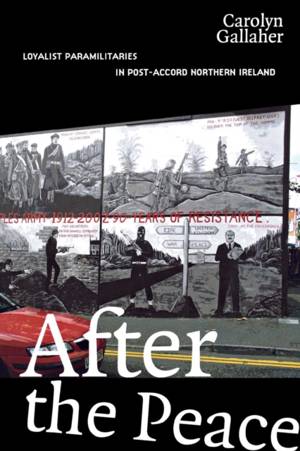
- Retrait gratuit dans votre magasin Club
- 7.000.000 titres dans notre catalogue
- Payer en toute sécurité
- Toujours un magasin près de chez vous
- Retrait gratuit dans votre magasin Club
- 7.000.0000 titres dans notre catalogue
- Payer en toute sécurité
- Toujours un magasin près de chez vous
After the Peace
Loyalist Paramilitaries in Post-Accord Northern Ireland
Carolyn GallaherDescription
The 1998 Belfast Agreement promised to release citizens of Northern Ireland from the grip of paramilitarism. However, almost a decade later, Loyalist paramilitaries were still on the battlefield. After the Peace examines the delayed business of Loyalist demilitarization and explains why it included more fits than starts in the decade since formal peace and how Loyalist paramilitary recalcitrance has affected everyday Loyalists.
Drawing on interviews with current and former Loyalist paramilitary men, community workers, and government officials, Carolyn Gallaher charts the trenchant divisions that emerged during the run-up to peace and thwart demilitarization today. After the Peace demonstrates that some Loyalist paramilitary men want to rebuild their communities and join the political process. They pledge a break with violence and the criminality that sustained their struggle. Others vow not to surrender and refuse to set aside their guns. These units operate under a Loyalist banner but increasingly resemble criminal fiefdoms. In the wake of this internecine power struggle, demilitarization has all but stalled.
Gallaher documents the battle for the heart of Loyalism in varied settings, from the attempt to define Ulster Scots as a language to deadly feuds between UVF, UDA, and LVF contingents. After the Peace brings the story of Loyalist paramilitaries up to date and sheds light on the residual violence that persists in the post-accord era.
Spécifications
Parties prenantes
- Auteur(s) :
- Editeur:
Contenu
- Nombre de pages :
- 264
- Langue:
- Anglais
Caractéristiques
- EAN:
- 9780801474262
- Date de parution :
- 10-10-07
- Format:
- Livre broché
- Format numérique:
- Trade paperback (VS)
- Dimensions :
- 161 mm x 234 mm
- Poids :
- 376 g

Les avis
Nous publions uniquement les avis qui respectent les conditions requises. Consultez nos conditions pour les avis.






